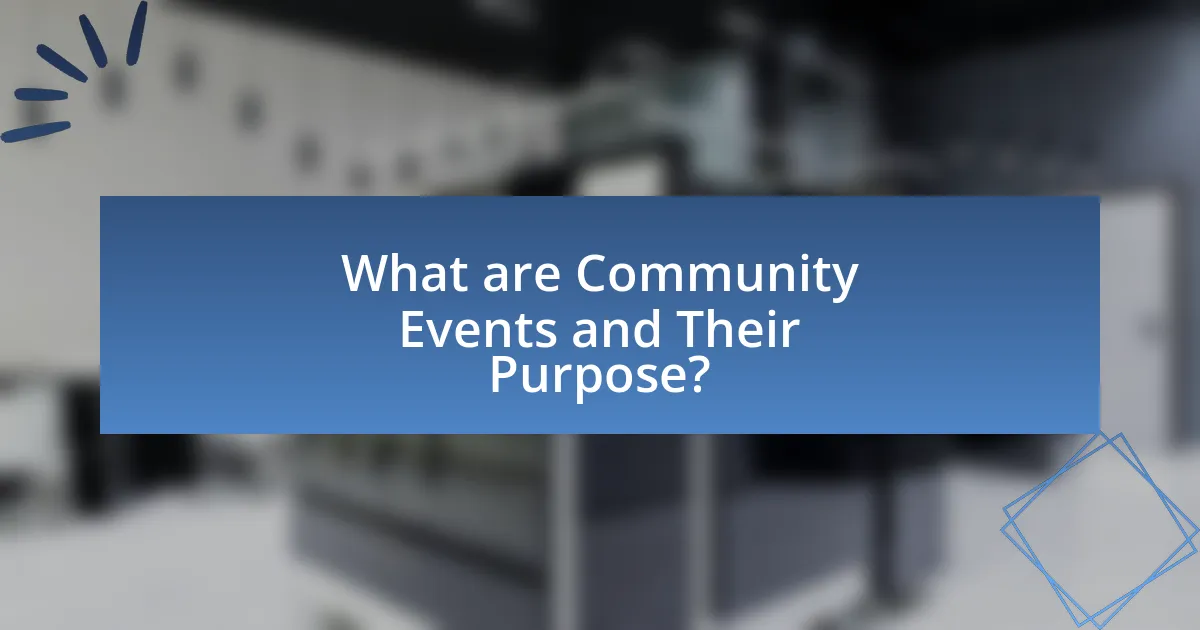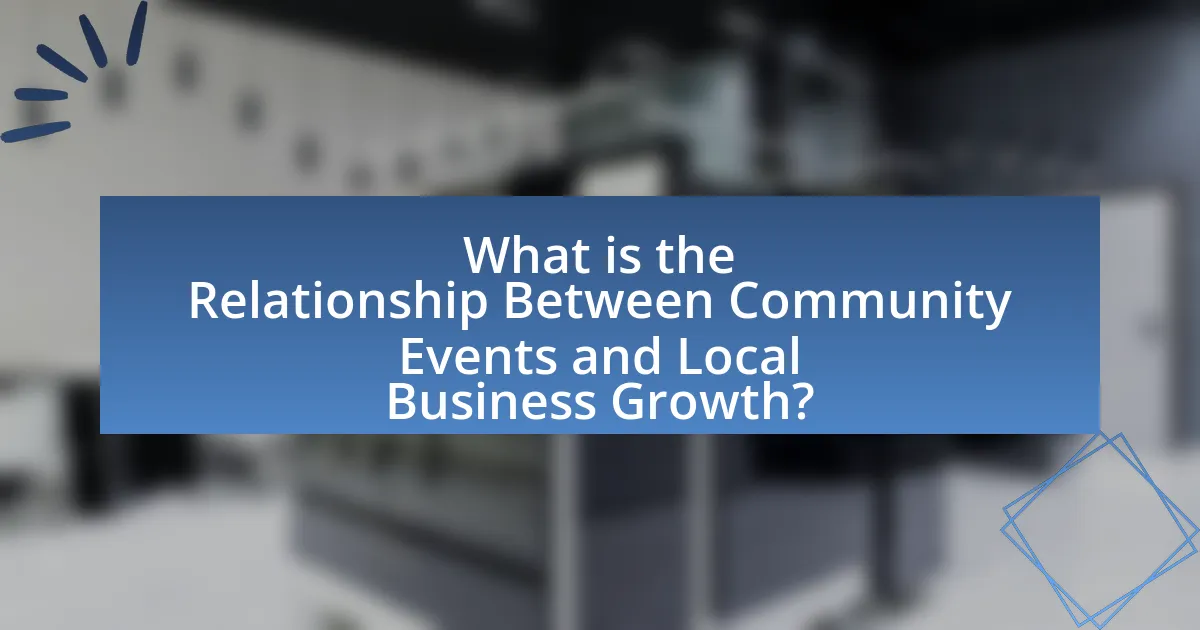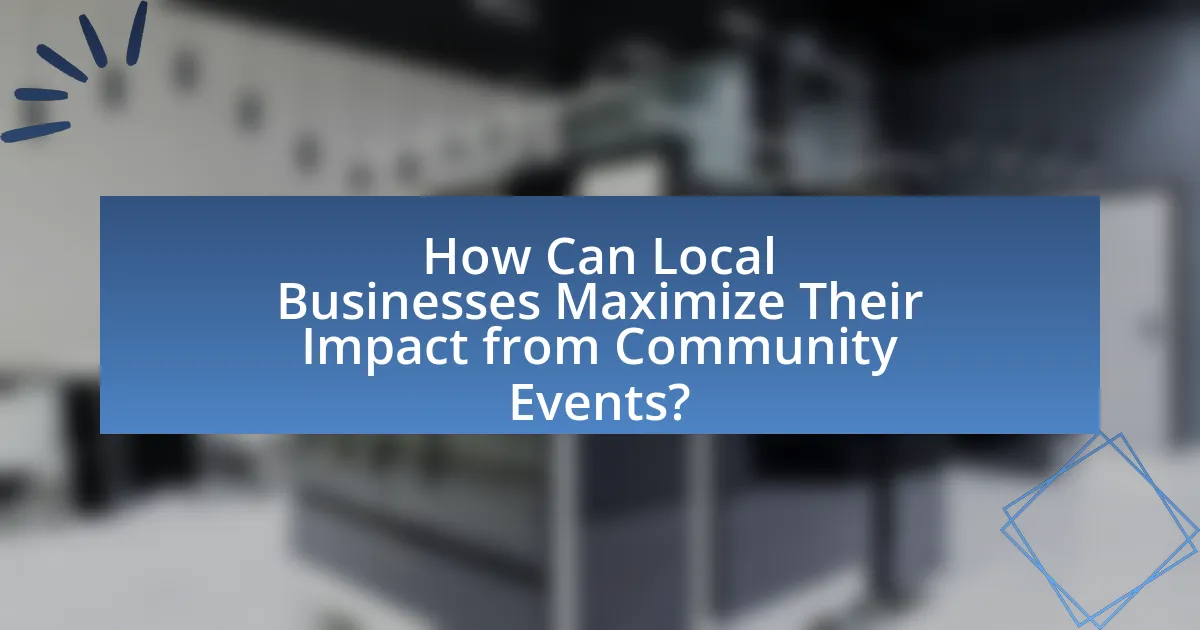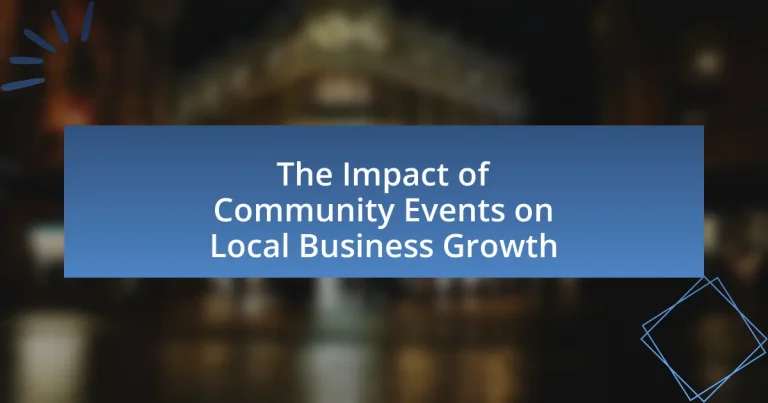Community events are organized gatherings that serve social, cultural, educational, or recreational purposes, playing a crucial role in fostering community engagement and supporting local economies. This article examines the impact of community events on local business growth, highlighting how these gatherings drive foot traffic, enhance brand visibility, and create networking opportunities. It discusses the types of community events, their economic contributions, and the importance of participation for local businesses, including strategies for maximizing engagement and measuring success. Additionally, it addresses potential challenges businesses may face and offers practical tips for thriving through community involvement.

What are Community Events and Their Purpose?
Community events are organized gatherings that bring together members of a community for social, cultural, educational, or recreational purposes. Their primary purpose is to foster community engagement, strengthen social ties, and promote local culture and businesses. For instance, events like farmers’ markets or local festivals not only provide entertainment but also create opportunities for local businesses to showcase their products, thereby driving economic growth within the community. Research indicates that such events can increase foot traffic to local businesses by up to 30%, highlighting their significant role in supporting local economies.
How do community events contribute to local economies?
Community events significantly contribute to local economies by driving increased consumer spending and fostering business growth. These events attract visitors who spend money on local goods and services, which can lead to a boost in sales for nearby businesses. For instance, a study by the National Endowment for the Arts found that community festivals can generate up to $1.5 million in economic activity, benefiting local restaurants, shops, and service providers. Additionally, community events create job opportunities, as they often require staffing for logistics, security, and vendor services, further stimulating the local economy.
What types of community events are most common?
The most common types of community events include festivals, farmers’ markets, parades, and charity events. Festivals often celebrate local culture and attract large crowds, which can significantly boost local business sales. Farmers’ markets provide a platform for local producers to sell their goods directly to consumers, fostering community engagement and supporting local agriculture. Parades, often tied to holidays or local traditions, draw attendees who may shop at nearby businesses. Charity events, such as fundraisers or community service days, not only raise awareness for causes but also encourage local spending. These events collectively enhance community cohesion and stimulate economic activity, as evidenced by studies showing increased foot traffic and sales for businesses during such gatherings.
How do community events foster social connections?
Community events foster social connections by providing a platform for individuals to interact, share experiences, and build relationships. These gatherings encourage participation from diverse groups, creating opportunities for networking and collaboration. Research indicates that social interactions at community events can lead to increased trust and a sense of belonging among participants, which are essential components of strong social networks. For instance, a study published in the Journal of Community Psychology found that community events significantly enhance social cohesion, leading to improved community well-being and engagement.
Why are community events important for local businesses?
Community events are important for local businesses because they foster customer engagement and enhance brand visibility. These events create opportunities for businesses to connect directly with potential customers, allowing them to showcase their products and services in a community-centric environment. According to a study by the National Federation of Independent Business, 70% of consumers are more likely to support local businesses that participate in community events, highlighting the direct correlation between community involvement and increased sales. Additionally, community events often attract foot traffic, which can lead to higher sales and customer loyalty for local businesses.
What role do community events play in brand visibility?
Community events significantly enhance brand visibility by providing direct engagement opportunities with potential customers. These events allow brands to showcase their products or services in a relatable context, fostering personal connections and trust. For instance, a study by the Event Marketing Institute found that 84% of consumers who attend events have a more positive perception of the brand, leading to increased brand recognition and loyalty. Additionally, community events often generate local media coverage, further amplifying brand exposure within the community.
How can community events enhance customer loyalty?
Community events enhance customer loyalty by fostering personal connections between businesses and their customers. These events create opportunities for customers to engage with the brand in a social setting, which strengthens emotional ties. Research indicates that 70% of consumers are more likely to remain loyal to a brand that actively participates in community events, as it demonstrates a commitment to the local community. Additionally, businesses that host or sponsor events can gather valuable customer feedback, further tailoring their offerings to meet customer needs and preferences, thereby reinforcing loyalty.

What is the Relationship Between Community Events and Local Business Growth?
Community events significantly contribute to local business growth by increasing foot traffic, enhancing community engagement, and fostering brand visibility. When community events are held, they attract residents and visitors, leading to higher customer turnout for local businesses. For instance, a study by the National Main Street Center found that towns hosting regular community events saw a 20% increase in sales for local retailers during those events. Additionally, these gatherings create opportunities for businesses to showcase their products and services, build relationships with customers, and strengthen their brand presence in the community. This symbiotic relationship between community events and local businesses ultimately drives economic development and enhances the overall vitality of the area.
How do community events drive foot traffic to local businesses?
Community events drive foot traffic to local businesses by creating a centralized gathering point that attracts residents and visitors. These events often feature activities, entertainment, and promotions that encourage attendees to explore nearby shops and restaurants. For instance, a study by the National Main Street Center found that communities hosting regular events saw a 20% increase in foot traffic to local businesses during those events. This influx of potential customers not only boosts sales for local merchants but also fosters community engagement and loyalty, further enhancing the local economy.
What impact does increased foot traffic have on sales?
Increased foot traffic positively impacts sales by driving higher customer engagement and purchase opportunities. When more customers enter a store, the likelihood of making sales increases, as evidenced by a study from the Journal of Retailing, which found that a 10% increase in foot traffic can lead to a 5% increase in sales. This correlation occurs because higher foot traffic often results in greater visibility and impulse purchases, enhancing overall revenue for local businesses.
How can businesses leverage community events for marketing?
Businesses can leverage community events for marketing by actively participating in or sponsoring these events to enhance brand visibility and engage with local audiences. By setting up booths, offering free samples, or hosting activities, businesses can create direct interactions with potential customers, fostering relationships and building brand loyalty. Research indicates that 70% of consumers feel more connected to brands that engage in community events, highlighting the effectiveness of this strategy in increasing brand awareness and customer trust.
What are the long-term benefits of participating in community events?
Participating in community events offers long-term benefits such as enhanced social connections, increased visibility for local businesses, and improved community cohesion. These benefits contribute to a stronger local economy, as businesses that engage in community events often experience higher customer loyalty and brand recognition. Research indicates that businesses involved in community activities see a 20% increase in customer retention rates, as community engagement fosters trust and relationships between businesses and residents. Additionally, community events can stimulate local spending, with studies showing that 70% of attendees are likely to support businesses that sponsor or participate in local events, thereby driving sustained economic growth.
How do community events contribute to business networking?
Community events significantly enhance business networking by providing a platform for local entrepreneurs and professionals to connect and collaborate. These events foster relationships through face-to-face interactions, allowing businesses to establish trust and rapport with potential clients, partners, and suppliers. According to a study by the Kauffman Foundation, 70% of small business owners reported that networking at community events led to new business opportunities. This statistic underscores the effectiveness of community gatherings in facilitating meaningful connections that can drive local business growth.
What are the potential challenges for businesses in community events?
Businesses face several potential challenges when participating in community events, including resource allocation, competition, and logistical issues. Resource allocation can strain budgets and staff, as businesses must invest time and money to prepare for and participate in these events. Competition from other local businesses can dilute individual visibility and customer engagement, making it difficult for any single business to stand out. Logistical issues, such as securing permits, managing event setups, and ensuring compliance with local regulations, can also pose significant hurdles. These challenges can hinder the overall effectiveness of community events in promoting local business growth.

How Can Local Businesses Maximize Their Impact from Community Events?
Local businesses can maximize their impact from community events by actively participating, engaging with attendees, and leveraging social media for promotion. Active participation allows businesses to showcase their products or services directly to potential customers, fostering personal connections that can lead to increased sales. Engaging with attendees through interactive activities or giveaways enhances visibility and creates memorable experiences that encourage word-of-mouth referrals. Utilizing social media platforms to promote their involvement before, during, and after the event can significantly expand their reach, as studies show that 70% of consumers are influenced by social media when making purchasing decisions. By combining these strategies, local businesses can effectively enhance their presence and drive growth through community events.
What strategies can businesses implement to engage with community events?
Businesses can engage with community events by sponsoring local activities, which enhances visibility and fosters goodwill. Sponsorship allows businesses to showcase their brand while supporting community initiatives, leading to increased customer loyalty. For instance, a study by the National Federation of Independent Business found that 70% of consumers are more likely to support businesses that contribute to local events. Additionally, businesses can participate in events by setting up booths, offering free samples, or providing interactive experiences, which directly connect them with potential customers and create memorable interactions. Engaging in community events not only boosts brand recognition but also strengthens community ties, ultimately contributing to local business growth.
How can businesses collaborate with event organizers for mutual benefit?
Businesses can collaborate with event organizers by sponsoring events, providing products or services, and engaging in cross-promotional marketing. Sponsorship allows businesses to gain visibility and brand recognition while supporting the event financially. For example, a local restaurant might sponsor a community festival, gaining exposure to attendees who may become future customers. Additionally, businesses can offer products or services that enhance the event experience, such as catering or equipment rentals, which can lead to direct sales and increased customer engagement. Cross-promotional marketing, where businesses and event organizers promote each other through social media and advertising, can expand reach and attract more attendees, benefiting both parties. This collaboration not only boosts the event’s success but also drives traffic and sales for local businesses, fostering community growth.
What promotional tactics can enhance visibility during events?
Promotional tactics that can enhance visibility during events include utilizing social media marketing, engaging in partnerships with local influencers, and implementing eye-catching signage. Social media marketing allows businesses to reach a broader audience by sharing event-related content, which can increase attendance and engagement; for instance, 73% of marketers believe that social media is effective for event promotion. Collaborating with local influencers can amplify reach, as their established trust with followers can drive more attendees to the event. Additionally, eye-catching signage can attract foot traffic and create a memorable brand presence, as studies show that effective signage can increase sales by up to 20%. These tactics collectively contribute to heightened visibility and can significantly impact local business growth during community events.
What best practices should businesses follow when participating in community events?
Businesses should prioritize engagement, preparation, and follow-up when participating in community events. Engaging with attendees through interactive activities fosters relationships and enhances brand visibility. Preparation involves understanding the event’s audience and aligning marketing materials with community interests, which can increase relevance and impact. Following up after the event, such as sending thank-you notes or promotional offers, helps maintain connections and encourages future interactions. Research indicates that businesses actively engaging in community events can see a 20% increase in local customer loyalty, demonstrating the effectiveness of these best practices.
How can businesses measure the success of their participation?
Businesses can measure the success of their participation by analyzing key performance indicators (KPIs) such as sales growth, customer engagement, and brand awareness. For instance, a business can track sales data before, during, and after the event to quantify any increases directly linked to participation. Additionally, customer engagement can be assessed through metrics like social media interactions, foot traffic, and feedback collected during the event. Brand awareness can be evaluated through surveys measuring recognition and recall before and after the event. These methods provide concrete evidence of the impact of participation on business growth.
What common pitfalls should businesses avoid at community events?
Businesses should avoid poor planning and lack of engagement at community events. Poor planning can lead to logistical issues, such as inadequate staffing or insufficient materials, which can diminish the overall experience for attendees. Lack of engagement, such as failing to interact with the community or not providing meaningful activities, can result in missed opportunities to build relationships and brand loyalty. According to a study by the Event Marketing Institute, 74% of consumers say they are more likely to buy from a brand after participating in an event, highlighting the importance of effective engagement.
What are some practical tips for local businesses to thrive through community events?
Local businesses can thrive through community events by actively participating, collaborating with other local entities, and leveraging social media for promotion. Engaging in community events allows businesses to showcase their products and services directly to potential customers, fostering relationships and brand loyalty. Collaborating with local organizations or other businesses can enhance visibility and create a sense of community, which is crucial for customer retention. Utilizing social media platforms to promote participation in these events can significantly increase reach and engagement, as studies show that 73% of consumers are more likely to purchase from a brand they follow on social media. By implementing these strategies, local businesses can effectively capitalize on community events to drive growth and enhance their presence in the market.


